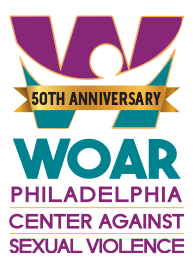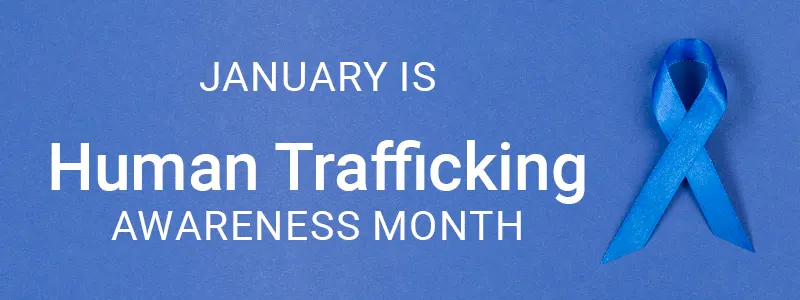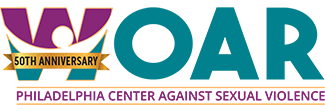Human Trafficking Prevention in Our Communities
by Amber Goltz, Manager of Anti-Human Trafficking
As Human Trafficking Awareness Month draws to a close, for us at WOAR this is an opportunity to highlight the important goal of preventing human trafficking in our communities. I am proud to serve as WOAR’s Manager of Anti-Human Trafficking.
WOAR started its anti-trafficking program as a result of the growing understanding of the intersectionality between sexual violence and human trafficking, and over time our commitment to serving victims and survivors of human trafficking has grown to include a support group, which just started another cohort on January 16th, individual therapy and counseling, and as-needed case management. The anti-trafficking program runs adult groups at the Philadelphia Industrial Correctional Center and human trafficking prevention groups for at risk youth at the Philadelphia Juvenile Justice Services Center (PJJSC), Unmask Youth Diversion Program, and at the Juvenile Justice Center of Philadelphia (JJC). We are very excited about our growing partnership with PJJSC in particular. WOAR has trained its entire staff on child exploitation and continues to do so as new staff are hired. Through this partnership alone, more than 120 youth have successfully completed the human trafficking prevention program.
Many misconceptions about human trafficking can be very damaging to victims and survivors. A common myth we hear often is that many people believe human trafficking only happens in other countries, or for instance that trafficked people are only people from other countries that are brought into the US. While both things can be true, people don’t realize that much of the human trafficking that occurs in our country involves the trafficking of US citizens domestically. This is a harmful misconception because it prevents people from adequately looking out for trafficking in their communities, neighborhoods, cities, and towns. For trafficking victims and survivors who are born in the US and trafficked in the US, this can result in them feeling like they’re not seen. Another common misconception is the idea that human trafficking involves movement from one place to another. Again while this can be true, it is also true that victims can be trafficked in their homes or other places without the involvement of movement or transportation. In fact, traffickers are often someone that the victim already knows, such as a family member, a trusted adult, or someone that they are in a relationship with.
It is also important to understand how certain vulnerabilities can make someone more at risk for being trafficked. First and foremost, we have learned from this work that anyone can be a victim of trafficking. Because of this, it is important to understand the factors that might put someone more at risk. For instance, it is important to screen for the risks of human trafficking amongst youth who are part of the child welfare system, placed in and out of home foster care, or living in under-resourced neighborhoods. For adults, it is important to be aware of risk factors including having a history of sexual/physical abuse, poverty, or addiction, or being part of a marginalized community.
It is also important to highlight that the work of preventing human trafficking cannot be done alone. The work to serve victims and survivors, and especially to prevent trafficking, takes the strength and dedication of many people, organizations, and partnerships. WOAR’s anti-trafficking program works closely with survivors and many organizations such as The Salvation Army New Day, Redeemed for a Cause, Philadelphia Children’s Alliance, Support Center for Child Advocates, and more.
If you are interested in any of the services that the anti-trafficking program at WOAR offers, please call our hotline at 215-985-3333 or email me, WOAR’s Manager of Anti-Human Trafficking, at amber@woar.org. If you are worried that someone may be a victim of trafficking you can also reach out to the National Human Trafficking Hotline at 888-373-7888.










